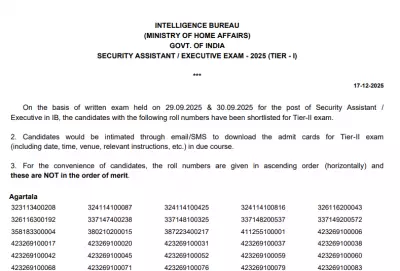
In a groundbreaking move that reshapes mathematical history, India's National Council of Educational Research and Training (NCERT) has unveiled a revolutionary Class 7 mathematics textbook that boldly traces the origins of algebra and advanced mathematical concepts to ancient Indian masters.
Ancient Mathematical Genius Unearthed
The newly introduced chapter, titled 'Mathematics in India: A Historical Perspective,' takes students on an extraordinary journey through India's rich mathematical heritage. Rather than presenting mathematics as a purely European development, the textbook highlights how Indian scholars were pioneering mathematical concepts centuries before their Western counterparts.
The Indian Masters of Mathematics
The textbook prominently features:
- Aryabhata (5th century CE) - The astronomical and mathematical prodigy who developed early algebraic methods and calculated pi with remarkable accuracy
- Brahmagupta (7th century CE) - The brilliant mind who formulated rules for using zero as a number and created systematic algebraic procedures
- Bhaskara II (12th century CE) - The mathematical visionary who made significant contributions to algebra and calculus concepts
Beyond Algebra: India's Mathematical Treasury
The textbook doesn't stop at algebra. It reveals how ancient Indian mathematicians were centuries ahead in numerous fields:
- Number System Revolution: The revolutionary decimal place-value system that transformed global mathematics
- Geometric Marvels: Advanced geometric principles used in temple construction and astronomical calculations
- Trigonometric Innovations: Early forms of trigonometry developed for celestial navigation and timekeeping
- Calculus Foundations: Concepts that would later form the basis of calculus developed by Kerala school mathematicians
A New Perspective on Mathematical History
This educational initiative represents a significant shift in how mathematical history is taught to young Indian students. By connecting modern mathematical concepts to their ancient Indian roots, the NCERT aims to:
- Instill cultural pride and confidence in students
- Provide historical context to abstract mathematical concepts
- Challenge the Eurocentric narrative of mathematical development
- Inspire students by showing their ancestors' contributions to global knowledge
Educational Impact and Global Significance
The inclusion of this historical perspective in the standard mathematics curriculum marks a pivotal moment in Indian education. Students will now learn that the algebra they study has direct connections to mathematical traditions developed on Indian soil over a millennium ago.
This approach not only makes mathematics more engaging but also helps students understand that mathematical knowledge has flowed from multiple civilizations, with India playing a crucial role in its development.
The textbook carefully balances historical context with modern mathematical pedagogy, ensuring that students receive both cultural awareness and strong foundational mathematical skills. This dual approach represents the future of mathematics education – one that honors the past while preparing students for the future.





